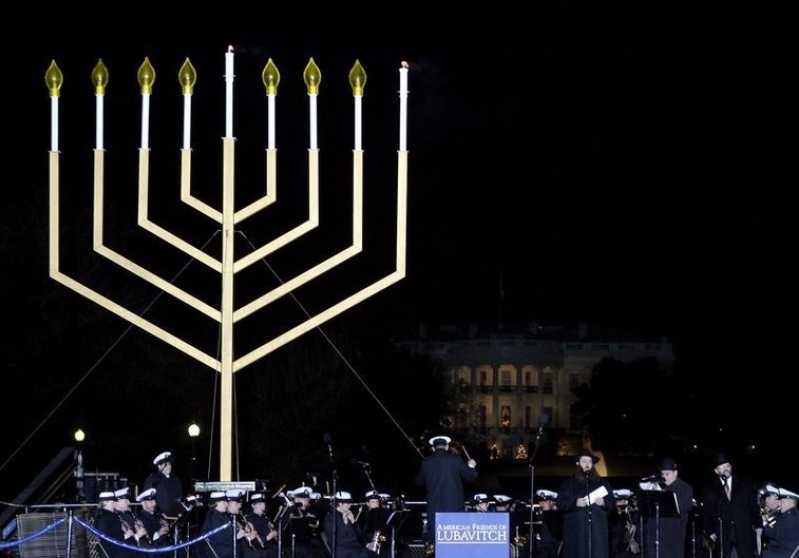
Jews around the world will gather today at sunset to celebrate the "Festival of Lights" known as Hanukkah. Families will gather to light a traditional menorah, say special blessings, and exchange gifts over eight nights.
Although this holiday is widely celebrated in Israel and across the West, Hanukkah has incorporated elements of American culture to stay relevant. According to an opinion article by Jonathan Zimmerman of New York Daily News, Jews seized upon this holiday of miracles in order to blend in with the American story.
"In traditional Judaism, Hanukkah was a minor festival," Zimmerman wrote. "It's mentioned briefly and rather cryptically in the Talmud, Judaism's canon of religious law and commentary. After a band of Jewish rebels called the Maccabees expelled Greek occupiers from their temple, the rebels kept it lit for eight days with a single day's worth of oil."
Zimmerman added that the eight candles, the eight nights of celebrations, and eight presents all symbolized that miracle.
Dara Lind of Vox Media reinforced that notion, citing that on most religious Jewish holidays, observant Jews have to abide by the same rules they do on Shabbat, or Saturdays, which include not working and restricting use of technology.
"Those rules aren't in play on Hanukkah," Lind wrote. "The only theological obligation on Hanukkah is lighting the candles on the menorah for each of the holiday's eight nights - the centerpiece of the holiday. Everything else that is associated with Hanukkah has just sprung up as custom over the millennia."
Historian Dianne Ashton showed in a 2010 NPR article that Jewish families in the United States incorporated present-giving to compete with Christmas. This started as early as the second half of the 19th century.
"We must do something to enliven the children," Cincinnati rabbi Max Lilienthal wrote in 1876. "They shall have a grand and glorious Chanukah festival nicer than any Christmas festival."
According to NPR, Hanukkah was being reinvented at a time when American culture starting embracing Christmas as a major holiday. It was reshaped by Jewish communities in America as an alternative to celebrating Christmas with their children and families.
"They didn't see Christmas as something they could do easily because it's Christian, but they did want to do something like that because it was American," Ashton said.
Zimmerman pointed out differences on how European Jews and American Jews celebrated Hanukkah.
"Europeans Jews had given coins or 'gelt' to children at Hanukkah, but the kids were supposed to present them in turn to their teachers," Zimmerman wrote. "In America, a land of almost unimaginable abundance, parents could shower the children with toys, clothes and sporting goods."
According to NPR, the celebration of Hanukkah changed between 1880 and 1920, when more than 2 million Jewish immigrants came to the U.S. from Eastern Europe.
"It became an occasion for them to do activities in the U.S. that they really couldn't do freely," Ashton said. "They had concerts in public halls, and restaurants had Hanukkah specials."
Ashton added that there were even kosher restaurants practicing the American custom of serving turkey dinners during Hanukkah.
Zimmerman commented that Hanukkah's appeal may be due to links within certain events in U.S. history.
"Jews frequently linked the Maccabees' revolt to the American Revolution, which had also repelled a foreign occupier," Zimmerman wrote. "In Cincinnati, Lilienthal even suggested that the Maccabees began their own rebellion with the battle cry 'Give me liberty or give me death,' the same challenge uttered by Patrick Henry."
Throughout the years, Hanukkah stood for various things. According to Zimmerman, it became a parable for the fight against Nazi anti-Semitism and genocide during World War II, and some Jews in the 1950s and 1960s resisted the idea of including holiday trees with their celebration.
"But some Jews set up trees nonetheless, giving them a distinctive name: Hanukkah bushes," Zimmerman wrote.
Zimmerman added that thanks to soaring Jewish intermarriage rates in the 1980s and 1990s, families increasingly fused holiday elements from different faiths.
"In my own home, we have both a menorah and a tree," Zimmerman commented. "We light the candles on all eight nights of Hanukkah, but we mostly reserve presents for Christmas Day. We're one of those jumbled, multi-faith American families, and we're mixing and matching as we go along."
As for the historic event Hanukkah is celebrating, Jordan Palmer of KSDK says it's not mentioned in the Torah because it happened after it was written. However, there was a scripture called "The Book of the Maccabees."
"While it's not included in the Jewish Bible, it is actually included in some versions of the New Testament," Palmer wrote. "It's believed that early Jewish scholars did not include this book in the Jewish bible because the story was about war and military victory, and less a spiritual event."







